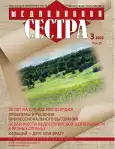Modern approaches to the professional development of teachers
- Authors: Khabibulina M.M.1
-
Affiliations:
- Ural State Medical University Yekaterinburg
- Issue: Vol 25, No 3 (2023)
- Pages: 23-26
- Section: Education: problems and solutions
- URL: https://journals.eco-vector.com/0025-8342/article/view/430166
- DOI: https://doi.org/10.29296/25879979-2023-03-04
- ID: 430166
Cite item
Abstract
In the modern world, in all developed countries, the system of advanced training of pedagogical personnel should be a relatively autonomous and more flexible subsystem of continuing professional education, since it is within its framework that the crisis of professional competence of a teacher can be overcome and the issue of training scientific and pedagogical personnel for activities in the conditions of modernization of both higher and general education can be solved. The proposed aspects of the teacher training system will be effective in the presence of a number of conditions: a special psychological climate of learning; educational activities are carried out using the technology of searching for new knowledge based on the existing individual and professional experience of students; specific learning principles are used (priority of independent learning, individualization, systematic learning); the learning process is carried out using new information and reflexive-creative technologies that contribute to the construction of individual trajectories of professional self-improvement of teachers. Thus, the use of these conditions of the mandatory process in the system of higher professional education will allow to prepare a professional specialist.
Full Text
About the authors
Marina M. Khabibulina
Ural State Medical University Yekaterinburg
Author for correspondence.
Email: m.xabibiulina@mail.ru
ORCID iD: 0000-0002-3240-1357
candidate of medical sciences, Associate Professor, Department of Polyclinic Therapy, Ultrasound and Functional Diagnostics
Russian Federation, YekaterinburgReferences
- Karsonov V.A. Modern pedagogical technologies. Saratov, 2004- 120c. (in Russ.).
- Bozhovich, L.I. Problems of personality formation: selected works. psychological works / L.I. Bozhovich; ed. by D.I. Feldstein. – 2nd ed., stereotype. – M.: Publishing House «Institute of Practical Psychology»; Voronezh: NPO «MODEK», 2009. – pp. 55–91. (in Russ.).
- Borovskaya N.V., Rean A.A. Pedagogy: educational special. St. Petersburg: Piter, 2016. -304 p. (in Russ.).
- Glukhanyuk N.S., Semenova S.A., Pecherkina A.A. General psychology: a textbook for universities. - M.: Academic Project; Yekaterinburg Business Book, 2015. - 3rd ed., supplement. and ispr. -368 p. (in Russ.).
- Amlaev K., Dakhkilgova H. Measures to improve literacy in health issues. Doctor 2018; (12); 83–87. (in Russ.).
- Khabibulina M.M. Pedagogical methods of optimizing the educational process in a medical university. Bulletin of the UGMU. 2022; 56(1): 68–71. (in Russ.).
- Kudryavaya N.V. Psychology for doctors / Edited by prof. Kudryavoy N.V. – M.: GEOTAR – Media, 2007. – 400 p. (in Russ.).
- Chernyadyev S.A., Ufimtseva M.A., Getmanova A.V., et al. The role of NEW MEDIA in the education of medical university students. Modern high-tech technologies. 2016; (2-3): 589–592. (in Russ.).
- Gordeeva, T.O. Questionnaire «Scale of academic motivation» / T.O. Gordeeva, O.A. Sychev, E.N.Osin. Psychological journal. 2014; 35(4): 98–109. (in Russ.).
- Habibulina M.M. Activity of a teacher in the process of education. A nurse. 2022; 24(4): 31–33. (in Russ.).
- Motova G.N., Navodnov V.G. Examination of the quality of education: a European approach. - Moscow: National Accreditation Agency in Education, 2008.- 100s. (in Russ.).
- Amlaev K.R., Bakunts S.A. Difficult communication with patients. Doctor. 2021 (12); 11–17. (in Russ.).
- Shamilov M.D. The opinion of students and patients about the professional qualities of a doctor. Medical register. 2022; 24(8): 32–34. (in Russ.).
- Kinnear A. Response to Edith Cowan students. Women Birth. 2017 Aug;30(4):e223. doi: 10.1016/j.wombi.2017.08.125. PMID: 28874280. «Medical education in Europe: a review of medical students’ expectations and satisfaction» (https://pubmed.ncbi.nlm.nih.gov/28874280/иhttps://pubmed.ncbi.nlm.nih.gov/27006037/
- Zhao, J., Xu, X., Jiang, H. et al. The effectiveness of virtual reality-based technology on anatomy teaching: a meta-analysis of randomized controlled studies. BMC Med Educ 20, 127 (2020). https://doi.org/10.1186/s12909-020-1994-z
- Milutinović D, Lovrić R, Simin D. Interprofessional education and collaborative practice: Psychometric analysis of the Readiness for Interprofessional Learning Scale in undergraduate Serbian healthcare student context. Nurse Educ Today. 2018 Jun; 65: 74–80. doi: 10.1016/j.nedt.2018.03.002. Epub 2018 Mar 8. PMID: 29533837.
- Amlaev K., Khoroshilova E. Management of socio-economic determinants of health at various levels. Vrach. 2018; (1): 85–87. (in Russ.).
- Ilyina, T.I. Methodology of studying the motivation of education in higher education [Electronic resource]. Access mode: http://testoteka.narod.ru/ms/1/05.html. (in Russ.).
- Shamilov M.D. Influence of motivation of medical students on the quality of education. Meditsinskaya sestra (The Nurse) 2022; 24(6): 16–19. (in Russ.).
- Aismontas B.B. Pedagogical psychology: Schemes and tests. – M.: VLADOS-PRESS Publishing house, 2004. – 208 p. (in Russ.).
- Reznik S.D. University teacher: technologies and organization of activities: Textbook. Edited by Prof. Reznik S.D. – M.: INFRA, 2009. – 389s. (in Russ.).
Supplementary files





